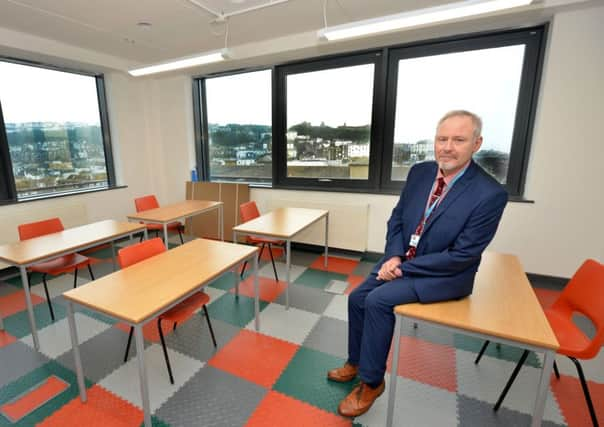Students choosing to learn locally


Figures released recently by UCAS reveal that 12,400 fewer UK students have applied to go to university in September 2018, than compared to the same point last year.
With tuition fees set to rise, an increase in the rate of interest on student loans, and a perceived lack of graduate jobs, many students are finding an alternative to university.
Advertisement
Hide AdAdvertisement
Hide AdIn a recent article The Guardian revealed that some university lectures could cost students £136 per hour, when taking into account the £9,000 fees and the amount of contact time they get with their tutor, leaving students wondering if a degree is really worth it?
But according to the University Centre Hastings; University is worth it, and it can be affordable to all.
Higher Education Manager David Fowler said: “The cost of university has increased dramatically over the past 15 years. Many students have their hearts set on university but are being put off by the increasing amount of debt. “That is why we’re reaching out to students to give them a much more affordable option, without sacrificing any of the quality.
“There are lots of fantastic opportunities available to college and sixth form students right on their door step. Traditionally, students want to move away from their home town to gain that university experience, but with fees set to rise to £9,250, interest rates on student loans rising from 4.6% to 6.1%, and the cost of living continuing to rise, many simply can’t afford to move away. I believe staying local is the answer.”
Advertisement
Hide AdAdvertisement
Hide AdStaying local appears to be a trend on the rise. Figures from the Higher Education Statistics Agency (HESA) show 638,855 full-time students in the UK were living with their parents, or in their own home, while studying last year. This was an increase of 40,755 from the 598,100 students who started a degree in 2015/16.
The cost of living in Hastings is also lower than other university towns and cities in the South East. According to Numbeo, a user-generated cost-of-living statistics website, essential living costs, such as rent and food, is approximately 45% less than compared to Brighton.
Poppy Carter, a first year BA (Hons) Graphic Communication at University Centre Hastings said: “In 2016 I started an art degree at Arts University Bournemouth, but due to the cost of living, decided to drop-out and move back home to Hastings. My student loan just about covered the cost of rent, leaving me very little money for essentials like food. Now I’m studying and living in Hastings, I have more money to spend on food and course materials, as well as enjoy the social aspects of uni.”
David Fowler said: “The quality of our provision in Hastings is fantastic. We have gained full confidence from the QQA (Quality Assurance Agency for Higher Education) for our teaching and standards. We offer over 30 higher education qualifications, including a number of higher apprenticeships, as well as 6 full honour, Bachelor of Arts subjects awarded by the University of Brighton. We’re able to offer these courses with the pull of a certificate from the University of Brighton, but saving students almost £2,000 a year than if they studied the equivalent subject elsewhere.
Advertisement
Hide AdAdvertisement
Hide Ad“We put all of our courses together with the industry in mind, adding strong vocational elements to the modules. This enables the students to take advantage of our excellent links with the community, Sussex employers, and international industry experts to increase their experience of working on live projects and build their own network of contacts. We’re able to offer smaller class sizes, in brand new lecture rooms and art studios, with increased and meaningful contact time with lecturers and tutors. When we follow the formula of working out our hourly lecture rate, students studying on our BA (Hons) art programmes could be paying up to 80% less.”
Helen Bowler, National Collaborative Outreach Programme (NCOP) coordinator in Hastings, also argues that lower living costs and lower fees would help to widen participation. The HESA revealed that there was only a 0.1% increase in the number of students from deprived areas attending university in autumn 2016 from the previous year.
“The increased cost of university, along with the scrapping of maintenance grants for students on low incomes, creates too many barriers for a lot of students from deprived areas. Why should talented students miss out on higher education because they cannot afford it?
“Hastings is the thirteenth most deprived of all local authorities, which is why we work to help make university more accessible.
Advertisement
Hide AdAdvertisement
Hide Ad“Some of the things that we can offer include a cash bursary to go towards the cost of attending university open days and interviews; we regularly hold one-to-one progression coaching sessions to discuss all kinds of higher education routes including HNC, HND, Top-up courses and Higher Apprenticeships; and the University of Brighton is helping to run study skills sessions to help those students who are re-sitting GCSE maths, to help boost their grades the second time around.
“The important thing is that we’re able to offer impartial information advice and guidance, to let them know about all the options that are out there and to see university as a springboard into their future career; more of an investment rather than a debt.”
Benefit from an ongoing discount on your Observer series titles by joining our voucher membership scheme. Once you’ve subscribed we’ll send you dated vouchers which can be exchanged for your paper at any news outlet. To save money on your Observer simply click here (www.localsubsplus.co.uk)